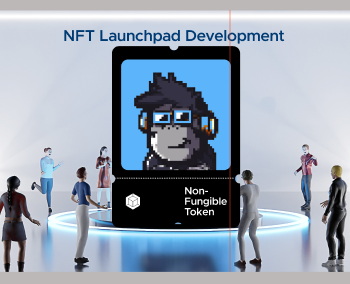-
An NFT launchpad/platform allows NFT creators to raise funds for their projects by selling a limited number of Non-Fungible Tokens (NFTs) representing ownership or membership in the project. One way for NFT launchpad development is to use Scaffold, a hub of prefabricated NFT solutions that includes basic architectures of an NFT marketplace, a minting platform, and more.
It essentially saves significant development efforts and time required in developing a project from scratch. NFT launchpad development enables fundraising for various types of NFT projects across industries like art, music, films, games, virtual real estate, and more. The NFTs sold on these platforms are unique and provide access to exclusive content, experiences, or benefits.
The crowdfunding aspect of these platforms allows NFT creators to raise funds by selling NFTs to many individuals, rather than a small number of investors.
It enables them to gain support from a large community of people who are excited about a project.
Additionally, NFT launchpads typically have a built-in marketplace where buyers can resell their NFTs, providing liquidity for the project and its supporters.
Also, Read | NFT Launchpad Development | A New Means of Crowdfunding
Must-Have Features in an NFT Launchpad Development
Minting and Management of NFTs
Creators can mint their unique digital assets, and manage them through the platform's interface.
Fundraising and Goal Tracking
Creators can set a fundraising goal for their project and track progress towards that goal.
Also, Read | Social Media NFT Marketplace Development Guide
Secondary NFT Marketplace
A built-in marketplace for buyers to resell their NFTs, which provides liquidity for the project and its supporters.
Access to Exclusive Content, Experiences, or Benefits
NFTs sold on these platforms provide access to exclusive content, experiences, or benefits related to a project.
Wallet Integration
The launchpad should be able to integrate with different blockchain wallets, so users can easily store, manage and transfer NFTs they own.
Royalties or Profit Sharing
The platform should allow creators to set royalties or profit sharing for secondary sales of their NFTs, enabling them to earn additional income from their work.
KYC/AML Compliance
It should be a must to require Know Your Customer (KYC) and Anti-Money Laundering (AML) compliance to comply with regulations and prevent illegal activities on the NFT launchpad.
Communication and Community-Building Tools
The platform can also provide tools for creators to connect with their communities and engage with their supporters.
Also, Read | Getting Started with INO (Initial NFT Offering)
Additional Features NFT Launchpad Development
Security
The NFT assets should be fully safeguarded by cutting-edge security measures, round-the-clock DDoS, and cutting-edge firewalls.
Compatible with Cross-Chain
A cross-chain compatible NFT launchpad can support data transfer across multiple blockchain networks and be fully interoperable with them. In today's ever-evolving blockchain development space, this feature is a must.
Various Level Staking
Utilizing multi-level staking modules, you may group investors using the NFT launchpad. It can ensure that investors receive higher payouts based on merit and participation.
Lending Pools
The platform should have autonomous liquidity pool features built in. The market cap can be greatly increased because it allows investors to stake native tokens, invest in liquidity pools, and earn rewards.
Storefront
Descriptions and more data, including price, ownership, bids, and price history, should be available for various NFTs and collections at the storefront of an NFT launchpad.
Search
Users should be able to easily search for desired NFTs and collections.
Filtering Choices
Users should be able to filter and rank NFTs based on price, niches, and time posted using search and sort options.
Reviews and Ratings
It enhances user experience as users are able to easily explore NFT collections using reviews and ratings. They should also be able to determine whether NFTs are reliable. Users that do best may also receive special incentives.
Bidding Features of the Bid
A crucial component of an NFT launchpad application is bidding and auctions because it attracts new customers to your platform.
After all, certain users enjoy flexible pricing and bidding. Additionally, buyers should be able to track the progress of their bids.
Also, Read | NFT Staking Platform Development Explained
NFT Launchpad Development Steps
Research and Planning
Study the current market and identify the needs of your target audience. Determine the features and functionality that will make your platform a success.
Design and Development
Create a wireframe or prototype of the platform and start developing it using appropriate technologies such as Ethereum, Solidity, and React. Oodles is an expert NFT launchpad development company that can help you in the process.
Integration
Integrate the necessary smart contracts for token creation and crowdfunding.
Testing
Test the platform thoroughly to ensure that it is secure and functional.
Deployment
Deploy the platform on a testnet or mainnet and make it available to users.
Marketing
Promote your platform to attract creators and backers.
Also, Read | Fractional Real Estate NFTs: The Next Wave of NFTs
It's important to note that developing an NFT crowdfunding platform is not an easy task. It requires a deep understanding of blockchain technology and smart contract development. It's best to consult with our blockchain developers and legal experts before starting the project.

Our Offices
INDIA
Emaar Digital Greens, Sector 61,
Gurugram, Haryana
122011.
Welldone Tech Park,
Sector 48, Sohna road,
Gurugram, Haryana
122018.















